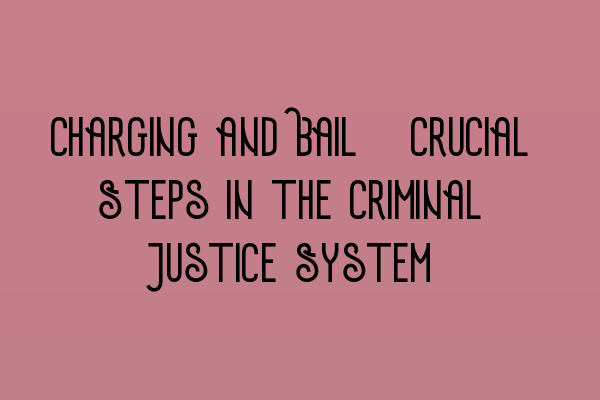Charging and Bail: Crucial Steps in the Criminal Justice System
The criminal justice system plays a crucial role in maintaining law and order in our society. As solicitors at SQE Criminal Law & Practice Law UK, we understand the intricate processes involved in this system. One of the key steps in the criminal justice process is charging and bail, which we will explore in this blog post.
Understanding Charging
Charging refers to the formal accusation of a person committing an offence. It is a crucial step in the criminal justice system where the evidence collected by the police is evaluated, and a decision is made whether to initiate legal proceedings against the accused. This decision is usually made by the Crown Prosecution Service (CPS) based on the evidence provided by the police.
Once the decision to charge has been made, the accused is notified and provided with details of the charges against them. This allows them to understand the nature of the offence they are facing and enables them to seek legal advice from a qualified criminal solicitor. It is crucial for individuals facing criminal charges to have legal representation to ensure their rights are protected and to navigate the complex legal processes that lie ahead.
It is important to note that charging does not equate to guilt. The accused is presumed innocent until proven guilty in a court of law. The charges are put forward as allegations that the prosecution must prove beyond a reasonable doubt.
The Role of Bail
After being charged, an accused person may be granted bail while awaiting trial. Bail is a temporary release granted to the accused, allowing them to remain free until their court hearing. The decision to grant bail is made by the court, taking into consideration various factors such as the seriousness of the offence, the likelihood of the accused attending their court hearings, and the potential risk they may pose to society.
In some cases, the court may impose certain conditions on the accused as part of their bail agreement. These conditions can include surrendering their passport, staying away from specific locations, or reporting to a police station regularly. Failure to comply with these conditions can result in the revocation of bail and the accused being remanded in custody until their trial.
Bail plays a vital role in the criminal justice system as it ensures that individuals who do not pose a significant risk to society are not unnecessarily detained while awaiting trial. It also enables the accused to better prepare their defense and gather evidence to support their case.
The Implications of Charging and Bail
Charging and bail have far-reaching implications for both the accused and the wider community. For the accused, being charged with a criminal offense can have detrimental consequences on their personal and professional life. It is essential for individuals facing charges to seek legal advice as early as possible to understand their rights and explore the available options.
At SQE Criminal Law & Practice Law UK, we offer comprehensive legal services to individuals facing criminal charges. Our highly skilled solicitors can guide you through the complexities of the criminal justice system, ensuring your rights are protected and providing expert advice tailored to your specific situation. We also offer SQE 1 Practice Exam Questions and SQE 1 Practice Mocks FLK1 FLK2 to help aspiring solicitors prepare for their exams and SQE 2 Preparation Courses to excel in the second stage of the qualification process.
In conclusion, charging and bail are crucial steps in the criminal justice system. They form the foundation of legal proceedings against an accused person and play a significant role in preserving the rights of individuals involved. If you or someone you know is facing criminal charges, it is essential to seek professional legal advice to ensure the best possible outcome. Contact SQE Criminal Law & Practice Law UK for expert assistance.
For more information on the SQE qualification process and exam dates, please visit our website: SRA SQE Exam Dates.
